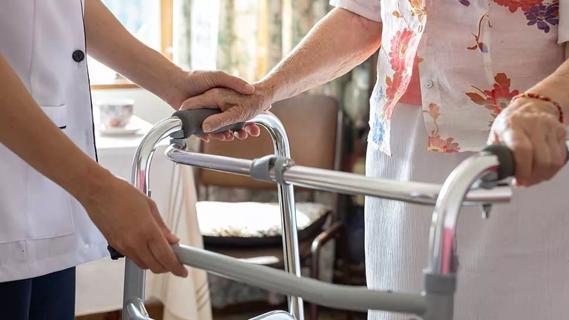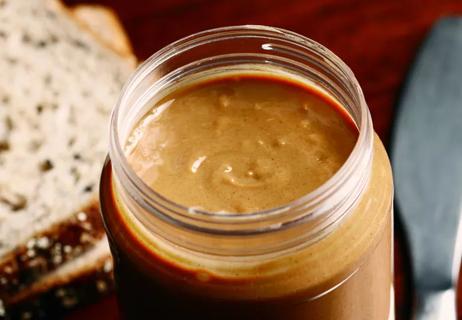Finding the causes of weight loss is key to treatment

Caring for someone with Alzheimer’s disease is a tough job, no doubt. And as your loved one’s condition progresses, new reasons to worry come up all the time.
Advertisement
Cleveland Clinic is a non-profit academic medical center. Advertising on our site helps support our mission. We do not endorse non-Cleveland Clinic products or services. Policy
Among those (many) common concerns are questions about your loved one’s weight. Specifically, weight loss. Because it’s very common for people with Alzheimer’s disease to shed pounds as their condition progresses. Some reports say up to 40% of people with dementia experience significant weight loss.
“Alzheimer’s disease and weight loss are intricately linked,” confirms Alzheimer’s disease specialist Jagan Pillai, MD, PhD. “There are dozens of reasons why people living with dementia lose weight. But when we can pinpoint why it’s happening, we can often find strategies for treating it.”
So, why exactly do people with Alzheimer’s disease lose weight? Dr. Pillai explains what’s happening and what can be done.
Weight loss is most common in the intermediate and later stages of Alzheimer’s disease, but it can happen much earlier, too. It can even be an early sign of dementia before a person is diagnosed with the condition in some cases.
Weight loss in older age can be cause for concern in anyone. That’s because weight loss often goes hand-in-hand with muscle loss, which can put you at risk for slips, falls, broken bones and a general decline in quality of life. And coupling those risks with a progressive brain disease like Alzheimer’s poses a real threat to your loved one’s well-being.
Advertisement
Dr. Pillai shares factors that can cause weight loss in people with Alzheimer’s.
As dementia progresses, it can change a person’s relationship with food and their ability to eat, which can lead to weight loss.
Food preferences may change, and favorite foods may no longer hold interest.
“As the disease progresses, people with Alzheimer’s may have completely different tastes for certain foods, or they may lose interest in food altogether,” Dr. Pillai explains. “For some people, their senses — like vision, smell and taste — can become impaired over time. That can make some foods seem less appetizing and makes stimulating their appetite difficult.”
Some people with Alzheimer’s disease may not be able to communicate those changes to their preferences or ask for foods they’d like to eat. They also may not be able to explain physical symptoms that affect their appetite, like stomach pain or discomfort.
What’s more is that people living with Alzheimer’s may also experience hallucinations or delusional thinking. That can lead to fear and distractions that get in the way of eating.
In later stages of Alzheimer’s disease, people may no longer recognize foods. And they can forget how to use utensils to bring food to their mouth. They can also lose the ability to safely chew or swallow food, which makes getting nutrition very difficult.
As we age, we tend to rack up a number of chronic health conditions and may rely on more medications to keep us healthy. And people with Alzheimer’s disease often live with other conditions that affect their health, in addition to living with Alzheimer’s. Those conditions are called comorbidities. Many comorbidities, and the medications used to treat them, can be associated with weight loss.
Unintentional weight loss may be a side effect of medication used to treat Alzheimer’s disease. It can also be associated with many conditions and medications to treat other conditions, including:
Advertisement
People with Alzheimer’s disease may lose weight because they can burn more calories compared to many older people who don’t live with the disease. Part of that reason may be that people with dementia frequently pace or wander. They’re more likely to be in motion. Through those activities, they may rack up their step counts and burn more calories than they take in.
If your loved one with Alzheimer’s disease is losing weight, check with their healthcare provider to get to the bottom of it.
“There are a lot of variables that can lead to weight loss, so the provider should be taking a very thorough look at what’s going on,” Dr. Pillai notes.
That may mean things like:
By understanding what’s causing your loved one to lose weight, you can work on strategies to stop the decline.
Their healthcare provider may suggest changing, starting or removing certain medications. For example, if a decreased appetite is the issue, some people may benefit from an appetite stimulant medication, which can work to increase feelings of hunger.
Advertisement
Or if a medication a person is taking is suspected to be at the root of their appetite decline, they may benefit from a different medication. Or maybe new chronic conditions have been identified that are contributing to weight loss and can be managed with new approaches.
For people who have trouble eating, a speech therapist may recommend a feeding strategy if there are reversible causes for the eating problems. That may include things like using different dishes or utensils to make it easier for the person to feed themselves. Or offering softer foods or foods that are cut into small pieces.
Some people may need someone to feed them by hand. Or in some cases, they may require a feeding tube to ensure they get nutrition and prevent choking.
Weight loss is common among people living with Alzheimer’s disease. But there are ways to help your loved one maintain their strength. Talk with their healthcare provider about your concerns — they’re valid and important.
Advertisement
Learn more about our editorial process.
Advertisement

Studies show the medication may have a protective effect, but more research is needed

Research suggests that up to 45% of current Alzheimer’s cases may have been avoidable

It’s critical to understand the wishes of your loved one and seek their involvement whenever possible

Your loved one may need help with daily activities, managing nutritional challenges and adapting their living space

Prevention and preparation can help you keep your loved one safe

This connection is yet another reason to seek help for OSA

Research on better diagnosis and treatment continues

Lifestyle changes can bring a slight metabolic boost and health benefits

The tropical fruit is a good source of antioxidants and vitamin C

Most people fall asleep within 10 to 20 minutes, but if your experience is different, adjusting your sleep schedule may help

Exploring your hidden side can lead to better understanding of what makes you tick